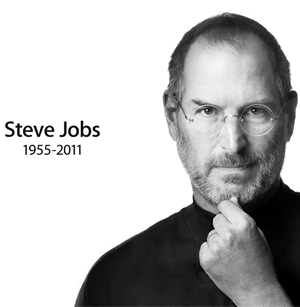Steve Jobs, Apple co-founder, dies aged 56


Apple pays tribute to visionary leader...

Steve Jobs passed away on 5 October, 2011Photo: James Martin/CNET
Steve Jobs, co-founder of tech giant Apple, has died at the age of 56.
The visionary technologist was twice CEO of Apple - the company he co-founded with Steve Wozniak and others in 1976 - leading it to its position as one of the highest valued in the world today.
Jobs had stepped down from his role as CEO in August, citing medical reasons.
Apple today paid tribute to Jobs.
"We are deeply saddened to announce that Steve Jobs passed away today," the board of directors said in a statement.
"Steve's brilliance, passion and energy were the source of countless innovations that enrich and improve all of our lives. The world is immeasurably better because of Steve.
"His greatest love was for his wife, Laurene, and his family. Our hearts go out to them and to all who were touched by his extraordinary gifts."
Under Jobs' leadership, Apple established itself as one of the world's most powerful consumer brands - turning technologies that its competitors had struggled to sell into must-have items, whether it was the iPod creating a market for MP3 players or the iPad creating a market for tablet PCs.
Jobs turned Apple into a disruptive company - changing the way music was bought and sold with the introduction of iTunes, and how software was created and delivered with the release of iOS App Store in 2008. By creating an ecosystem of content under Apple's control, Jobs established a new model that Apple's competitors in the consumer gadget space have struggled to match.
The extraordinary success that Jobs brought Apple was linked to his forceful and uncompromising attitude. Jobs was famously hands-on, taking to the stage in his trademark mock turtleneck to launch new products in highly anticipated presentations that became known as 'Stevenotes'. Jobs became so closely identified with Apple's products that he inspired an almost cultish devotion among Apple fans.
Jobs was born in San Francisco in 1955 and took his name from his adoptive parents, Paul and Clara Jobs. He grew up in Mountain View and Cupertino, the site of Apple's headquarters today.
Jobs attended Reed College in Oregon for a year but dropped out. After working at Atari making video games he took time out to...
...backpack around India, where he developed an interest in Buddhism.
It was upon Jobs' return to the States that Apple Computer was born. Jobs partnered with his friend Steve Wozniak to sell the Apple I, the computer that Wozniak had hand-built.
Apple Computer was born out of a partnership between Jobs and his friend Steve WozniakPhoto: James Martin/CNET
Working out of a garage, the pair sold a few hundred of the computers but it was with the Apple II that they found success. The machine would become one of the most successful computers of the 80s - shipping an estimated five million units by the time it was discontinued in 1993.
Four years after Apple went public in 1980, Apple unveiled the Apple Macintosh - with a bold marketing campaign showing how the Mac would smash its bland competitors. It established Apple's and Jobs' reputation for no-holds-barred marketing and brash claims for its products - the so-called 'reality distortion field' - which was just as evident in the company's more recent campaigns for its iPod, iPhone and iPad.
Unfortunately for Jobs in 1985, just a year after the Mac's release, he was effectively forced out of Apple by new CEO John Sculley and the management board. Jobs later told an audience of Stanford University graduates "what had been the focus of my entire adult life was gone, and it was devastating."
The following years saw Jobs broaden his activities - founding the computer maker NeXT and buying the graphic arts division of Lucasfilm, Pixar, in 1986. Jobs helped Pixar become one of the most beloved and lauded animation studios. Jobs bought the studio in 1986 and under his ownership the studio earned four Oscar nominations for its films and became a household name.
Jobs rejoined Apple in 1996 as an advisor to Apple CEO Gil Amelio after Apple bought NeXT for $429m, and became interim CEO in September 1997.
Jobs faced an uphill battle to revive Apple's fortune. He axed struggling products such as the handheld Apple Newton computer and introduced new computers with striking designs and easy-to-use UIs such as the iMac and the portable iBook. The milestones to Apple's multibillion-dollar revival followed: the iPod digital music player and iTunes Music Store in 2001, the touchscreen Apple iPhone in 2007, the App Store in 2008 and the iPad in 2010.
And yet for Jobs, the last few years were marred by a series of health problems. He underwent surgery for a rare form of pancreatic cancer in August 2004, and had a liver transplant in 2009 during a six-month leave of absence. He returned to work until August of this year when he stepped down as Apple CEO telling employees: "I have always said if there ever came a day when I could no longer meet my duties and expectations as Apple's CEO, I would be the first to let you know. Unfortunately, that day has come."
Read more here: